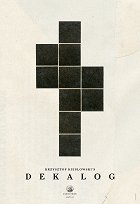Rendező:
Krzysztof KieslowskiZeneszerző:
Zbigniew PreisnerSzereplők:
Henryk Baranowski, Jerzy Stuhr, Daniel Olbrychski, Boguslaw Linda, Piotr Rzymyszkiewicz, Olaf Lubaszenko, Wojciech Klata, Wladyslaw Kowalski (több)Epizódok(10)
-
Az első parancsolat: "Én vagyok a te Urad, Istened. Uradat, Istenedet imádjad és csak neki szolgálj !" (E01)
-
Második parancsolat: "Isten nevét hiába ne vegyed" (E02)
-
Harmadik parancsolat: "Megemlékezzél arról, hogy az Úr napját megszenteljed" (E03)
-
Negyedik parancsolat:"Atyádat és anyádat tiszteljed!" (E04)
-
Ötödik parancsolat: "Ne ölj!" (E05)
-
Hatodik parancsolat:"Ne paráználkodj!" (E06)
-
Hetedik parancsolat:"Ne lopj" (E07)
-
Nyolcadik parancsolat:"Hamis tanúságot ne szólj felebarátod ellen!" (E08)
-
Kilencedik parancsolat: "Felebarátod feleségét ne kívánjad!" (E09)
-
Tizedik parancsolat:"Felebarátod házát, mezejét, másféle jószágát ne kívánjad!" (E10)
Tartalmak(1)
A Magyar Televízió 1991. augusztusától sugározta első alkalommal és nagy sikerrel az azóta sajnos elhunyt Krzysztof Kieslowski által rendezett tévésorozatot, amely a Tízparancsolat egyes pontjaihoz kötődve mindennapi történeteket mesél el kitűnő színészek közreműködésével. Az egyes epizódok közvetlenül nem függnek össze egymással, a Tízparancsolat azonban egy gondolati csokorba fogja őket. (DunaTV)
(több)Felhasználói recenzió kaylin ehhez a sorozathoz (10)
I don't follow Polish productions much, but I'm starting to feel like that's a mistake. There is something great in every filmography. And this relatively ordinary story is presented incredibly emotionally, even though it doesn't try to squeeze emotions out of you, but simply creates them within you, much like life itself would.
()
Második parancsolat: "Isten nevét hiába ne vegyed" (1990) (E02)
While watching this installment, you realize that it's not the environment itself that necessarily feels negative, but rather the people who work in it, who traverse through it. It's as if none of the characters here have any joy left in them, as if there's more dying than living in each one, which contrasts with the fact that the main character is pregnant. Again, powerful and unpleasantly depressing.
()
For me, so far, the weakest film about how people can't seem to live without people they might not even need that much. It's very difficult for us to find our place in the world and then maintain it in any reasonable way. The heroes are kind of interesting, but they can still kind of repel you with their behavior.
()
It's definitely not an episode that I'll consider the best, but as I watched it and followed the theme, I thought it was quite daring, yet at the same time, I thought it could have been approached a bit differently. Still, Kieślowski managed to create a clever film out of it rather than just catering to enthusiasts' fetishes.
()
Ötödik parancsolat: "Ne ölj!" (1990) (E05)
If you've seen A Short Film About Killing, this is a shorter version of it in the Decalogue series. The story is exactly the same, the shots are the same, it's just crammed into a shorter runtime of less than an hour. Still, it's a film that hits you, and that shows how senseless killing is, just as the death penalty is strange.
()
Hatodik parancsolat:"Ne paráználkodj!" (1990) (E06)
I guess there's not much to be surprised about. It's basically the premise of Rear Window but taken in a completely different direction with entirely different consequences in a different genre. The voyeurism is brilliantly captured here, but even better is the overall climax, which is unexpected yet somehow the only logical conclusion. Hats off. No wonder Kieślowski stretched it to an hour and a half in A Short Film About Love.
()
Hetedik parancsolat:"Ne lopj" (1990) (E07)
Another very good episode in the series of ten films. It’s the story of a woman who had a baby perhaps too soon, but thought she was ready. An interesting situation that isn't taken to absurdity, but it feels like it's not far from it. The ending here is good and manages to affect you quite convincingly. Kieślowski made something big, even if he shows it in small stories.
()
After the strong stories within the Decalogue series, there comes one that's a bit weaker, which, considering the theme, initially appears very strong, but in the end, it turns out not to be that remarkable. And it really isn't. Somehow I was expecting more from this film and the guilt here is not presented in a way that really gets to me.
()
Decalogue certainly doesn't always feature stories that hold onto hope at all costs, but in this case, it's a story that's kind of nicely funny, even though it's actually cruel. This is a story where the happy ending fits because you don't feel like it's a real happy ending, but something that was hard-fought.
()
I can't help it, but even though the tenth installment of the Decalogue series is probably the most positive of all, at least in terms of how it's humorously filmed, I still liked this episode the least. In the end, I lean more towards depressing films, even the ones where people die. This is a pretty tragic finding about myself.
()

